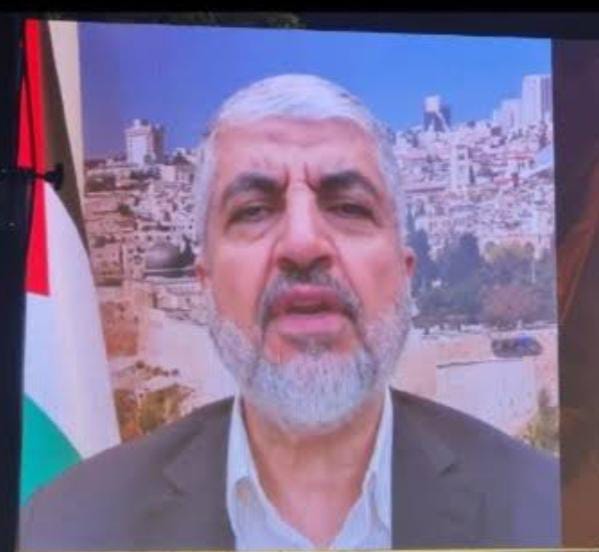Sagarika Mitra, Content Head of JAN KI BAAT analyses the Hamas Kerala Controversy in detail
Gaza is 4,572 kilometres away from India but Hamas is closer to home. Only yesterday, Hamas terrorist -Khaled Meshaal – who is believed to be one of the masterminds behind the attack on Israel on October 7th, 2023 – virtually addressed a rally organized by the ‘Solidarity Youth Movement’ in Kerala’s Malappuram. ‘Solidarity Youth Movement’ is Jamaat-e-Islami Hind’s youth wing.
The virtual participation of a Hamas terrorist in the rally titled ‘Raise against Zionist-Hinduist racism’ in Kerala is more than just a subject of news debates and Twitter outrage. It’s a mammoth security concern for the nation. As per a report in OpIndia, Khaled Meshaal’s video address was around 7 minutes long, during which slogans like ‘Buldoze Hindutva’ and ‘unroot Zionism’ were chanted by the audience. It is not confirmed whether the video address was live or it was a recorded one.
This incident is a stark reminder that the actions of a group like Hamas, despite being geographically distant, can have far-reaching implications, particularly in a nation like India, which has its share of internal security challenges.
Nupur Sharma, Editor of OpIndia believes – ‘Hamas is right next door. Hamas lives in every Islamist.. including Indian Islamists’
Why the virtual presence of Hamas leader at a rally in Kerala can’t be taken lightly?
The confluence of these groups in a mass rally in Kerala, organized under the banner of ‘uprooting Zionism and Hindutva’, raises serious questions about the implications for India. This alarming development reminds one of a pre-1947 strategy of reviving Muslim separatism and casting Hindus as oppressors, which demands attention from all quarters of Indian society.
Steps must be taken to evaluate and monitor activities of groups with links to Hamas and other radical outfits. This includes scrutinising financial flows, identifying recruitment efforts, and tracking any direct or indirect support systems. It is imperative for Indian authorities to closely monitor and investigate these alignments. The National Investigation Agency (NIA) and the Ministry of Home Affairs should take this matter seriously. Kerala, known for its pluralistic ethos and harmonious coexistence of various religious communities, should not become a breeding ground for extremist ideologies.
Furthermore, it is essential for all responsible citizens and civil society to raise their voices against these worrying connections. It is a call to action for every Indian to safeguard the nation’s security and communal harmony. As the world grapples with the persistent threat of global terrorism, India must remain united against any potential danger, regardless of its form or source.
Kerala’s ISIS & PFI connection
In 2019, a report in The Indian Express said that security agencies estimated that some 100-120 individuals from Kerala either joined, or tried to join, ISIS. Some of them moved to Syria or Afghanistan from the Middle East, where they were employed; others migrated from Kerala. Even in 2018, when ISIS was largely in retreat in Syria and Iraq, 10-odd people from Kerala made the journey
Last year in September, Kerala police arrested over 2,200 PFI linked leaders and activists after PFI members damaged vehicles, hurled explosives and vandalised establishments across Kerala during a hartal over the arrest of its senior members by the NIA
The presence of a Hamas leader in an event with provocative rhetoric targeting Hinduism in Kerala’s Mallapuram cannot be ignored. The potential for such events to fuel radicalism and communal tensions must be acknowledged.
What does Hamas represent in today’s geo-political scenario?
Hamas, short for “Harakat al-Muqawama al-Islamiya” or the Islamic Resistance Movement, is widely recognized as a terrorist organization. It was founded in 1987 during the First Intifada, an uprising against Israeli rule, with the explicit goal of opposing the existence of Israel and reclaiming what it considers Palestinian territories.
Hamas has a history of employing violence and terrorism as means to achieve its objectives. It has been responsible for countless attacks, including suicide bombings, rocket attacks, and other forms of violence against Israeli civilians.
Hamas’ audacious terror attack on Israel on October 7th, demonstrates its determination to use various means, including air, sea, and land, to achieve its objectives. The aftermath of the attack on October 7th prompted Israel and the United States to draw a parallel between Hamas and notorious terrorist organizations like the Islamic State (ISIS) and Al-Qaeda. This comparison is not unwarranted, given the scale and brutality of the operation. The attack claimed over 1,400 Israeli lives, including civilians and soldiers, and marked a significant escalation in violence. From killing babies to burning innocent civilians alive to kidnapping unsuspecting concert goers and raping women, while fulfilling their acts of depravity – Hamas’ brutality left the world in a state of deep shock.
Should India Officially Designate Hamas as a Terrorist Organization?
Despite the increased global attention on Hamas as a terrorist organization, designating it as such in India is a multifaceted challenge. The last major international and transnational terrorist group banned by India’s Ministry of Home Affairs was ISIS in 2015. India employs the Unlawful Activities (Prevention) Act of 1967 (UAPA) to proscribe such groups. As of March 2023, 44 organizations were on India’s terrorism listing under the UAPA, including Islamist, far-left (Maoist), pro-Khalistan groups, and secessionist movements, particularly from the Northeast.
The UAPA imposes localised requirements for such groups to be added to the terrorism listing. These conditions include conducting activities such as operations, finances, and recruitment within Indian territories where Indian laws are applicable. Hamas has no known history of such activities within India.
Designating Hamas as a terrorist organization in India is undoubtedly a complex endeavor. It requires a careful balance between India’s historical support for the Palestinian cause and its unwavering commitment to fighting terrorism on a global scale. India’s evolving role in international counter-terrorism efforts and the stringent legal requirements for such designations make this a challenging decision that demands a thorough assessment of the available evidence and the organization’s activities.
What is India’s stand on Hamas?
The recent terror attack against Israel has sparked international condemnation, drawing attention to the stance of various countries, including India, on the issue of Palestine and terrorism. Prime Minister Narendra Modi’s tweet condemning the attack has ignited discussions on India’s historical position regarding the Palestinian cause and its recent efforts to address global terrorism as a grave threat.
India has a long history of supporting the Palestinian cause and advocating for a two-state solution in the Israel-Palestine conflict. However, in recent years, India has also actively participated in global counter-terrorism initiatives, emphasizing the need to combat terrorism as a global scourge. Hosting the United Nations Security Council Counter-Terrorism Committee meeting in 2022 was a significant milestone in this regard.
PM Modi’s public condemnation of terror attacks aligns with India’s evolving role in counter-terrorism efforts. India cannot afford to be perceived as ambivalent on this issue, given the strides it has made in international forums, including the UN, where it has championed the fight against terrorism.
The Ministry of External Affairs too reiterated India’s unwavering commitment to a zero-tolerance policy for terrorism. This commitment is crucial, especially in the wake of the changing dynamics in regions around India.

